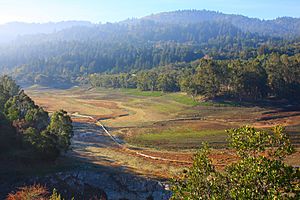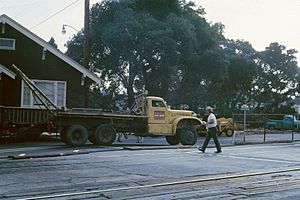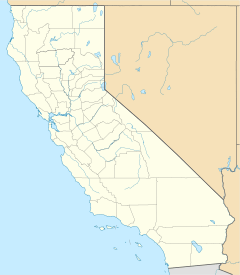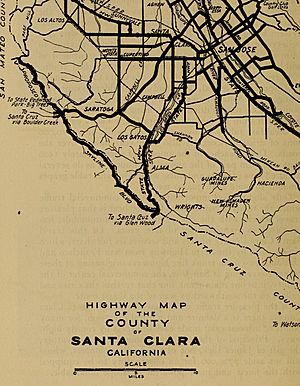Alma, California facts for kids
Quick facts for kids
Alma
|
|
|---|---|

Lexington Reservoir at low water, the former site of Alma as it appeared in 2008.
|
|
| Country | United States |
| State | California |
| County | Santa Clara |
| Time zone | UTC-8 (Pacific (PST)) |
| • Summer (DST) | UTC-7 (PDT) |

Alma is a ghost town and a "drowned town" in Santa Clara County, California. It lies hidden beneath the waters of the Lexington Reservoir, which is located above the town of Los Gatos. Alma is found at latitude 37.18N and longitude 121.98W, and it was once 551 feet (168 meters) above sea level.
The town's name might have two different origins. One idea is that it was named because it was a branch road leading to the New Almaden mine. Another idea is that it was named after a local woman. The town was first registered with the Postal Service in 1861 as Lexington. It was later re-registered as Alma in 1873.
Contents
A Town Underwater
Alma was mostly torn down when the James J. Lenihan Dam was built in 1952. At that time, Alma had fewer than 100 people living there. The town was an important stop for trains carrying logs from the Santa Cruz Mountains. It was also a popular stop for people going on vacation to the coast from the Santa Clara Valley. Just north of Alma was another town called Lexington, which had already become much smaller when the dam and reservoir were built.
Alma had many businesses, including a stagecoach stop, a hotel, saloons, small farms, a general store, and lumber mills. The South Pacific Coast Railroad served Alma from 1880 to 1940. This train line connected Los Gatos and Santa Cruz, passing through a place called Wrights.
When the water levels in the reservoir drop very low, you can sometimes see parts of the old town. Some old roads and a bridge from 1926 become visible. The bridge was seen in the summer of 2008 when dam construction lowered the water to only 7% of its normal level. Today, State Route 17 passes right by the reservoir, with the former towns of Lexington and Alma lying beneath the water.
Alma Helitack Base
CAL FIRE has one of its 11 helitack bases near where the town of Alma used to be. This base, called Alma Helitack Base, is home to a helicopter and a fire engine. They help fight wildfires in the area.
Alma College: A School's Journey
Alma College was a special school located west of Alma, on Alma College Road. It was situated above the Lexington Reservoir. The college was a Jesuit seminary, which is a school for people studying to become priests. It opened in 1934. It was built to serve the needs of two Jesuit groups, one from California and one from Oregon.
Moving to Berkeley
In February 1969, the school moved to Berkeley. It became part of the Graduate Theological Union and was closer to the University of California. In June 1969, the school's leaders voted to change its name from Alma College to the Jesuit School of Theology at Berkeley.
Today, the Jesuit School is one of only two Jesuit theology centers in the United States run by the Society of Jesus. The school aims to be a worldwide center for studying theology and ministry, welcoming students from all over the world.
Earthquake and Land Changes
The original college buildings were badly damaged by the Loma Prieta earthquake on October 17, 1989. After the earthquake, the Jesuits sold the property.
Later, in 1999, the Mid-peninsula Regional Open Space District made a deal to buy the former college site. This area covers about 1,071 acres (4.33 km2) of wooded hillsides. This was a very important agreement for the district. The goal was to protect this large area as open space for everyone to enjoy.
Even though the land was heavily logged in the late 1800s, it still has one of the biggest and best second-growth redwood forests in the county. Some of the redwood trees on the property are thought to be 800 to 900 years old.
See Also
 | Jewel Prestage |
 | Ella Baker |
 | Fannie Lou Hamer |



